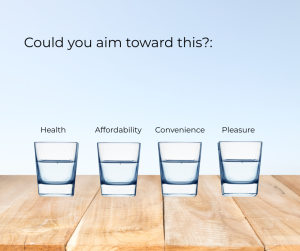
One of the things I hear over and over again from patients is that cooking dinner is hard.
- “It’s hard to cook for a whole family.”
- “It’s hard to cook for just two.”
- “It’s hard to cook for one.”
- “It’s hard after a long day at work.”
- “It’s hard when I work from home.”
- “It’s hard when I’m shuttling kids around all weekend.”
Honestly, I’ve heard all of these statements more times than I can count – often in the same day.
And I get it. I have to cook – every night. Sometimes for one, sometimes for five. Almost always after working. Almost always while juggling kid stuff and other responsibilities.
I think it’s worth unpacking what we actually mean when we say “it’s hard to cook.” Because if we’re talking about being a gourmet chef or recreating something we saw on a cooking show, that can be hard. But making a simple dinner – something like baked chicken, broccoli, an apple, and maybe a side salad? That’s not actually hard. It doesn’t take much time. It doesn’t cost much. And it certainly isn’t harder than pulling through a drive-through or waiting on a food delivery app.
So what is hard about getting dinner on the table every night?
It’s not the mechanics.
It’s the mental energy.
It’s the preparation.
If we wait until the moment we’re hungry to think about what we’re going to eat, it’s absolutely going to feel overwhelming. Because now we have to:
- Decide what to eat
- Go get it
- Bring it home
- Cook it
That’s not necessarily hard – it’s just exhausting – especially at the end of a long day when we are already mentally drained. But it’s not about cooking skills. It’s about planning – and priorities.
We plan things in life that matter.
We don’t wait until the first day of school sports and then try to schedule a physical.
We don’t land in Florida and then start looking for a hotel.
We plan ahead because we value those things.
Food is the same.
We don’t value cooking healthy foods at home. Why?
One of the reasons I see a lot is that we’ve merged “food for nourishment” with “food for pleasure.”
We want food to provide us with pleasure. With bliss. And more often than not, a meal of grilled chicken and broccoli doesn’t check that “pleasure” box.
Combine what feels like sacrifice – eating food that feels meh compared to something we absolutely love – with increased mental energy required to plan ahead – and it’s really hard to justify it.
We end up telling ourselves stories like:
- “Eating healthy is too expensive.”
- “Cooking is just too hard.”
- “It takes too long.”
But what it really comes down to is that we haven’t prioritized it.
That doesn’t mean we’re lazy or failing. It just means we’re human. We have limited energy. And when food prep doesn’t feel like it brings us enough value – emotionally or practically – it’s the first thing we cut.
This is also why we talk so much about hunger and biology.
When you carry extra adipose tissue, your hunger hormones are elevated. That hunger isn’t a lack of willpower – it’s biochemistry.
And that hunger can be suppressed. With medication (while it’s active). With protein and fiber,
Or… it can be made worse with ultra-processed foods.
When we default to what’s fast and easy – because we’re tired or unprepared or stuck in our habits like ruts in the road – we’re often reinforcing the very problem we’re trying to solve.
That’s why obesity treatment isn’t just about medication.
If we don’t see our habits and patterns for what they are and how they keep us stuck in loops, and work to build new habits and systems, eating differently will always feel like a drain. And we will keep going back to the foods that drive hunger hormones.
And if we’re looking for food to constantly provide us with a great deal of pleasure, “boring” meals at home won’t ever feel worth it.
Whether or not it’s conscious, we typically make our food decisions in terms of four buckets.
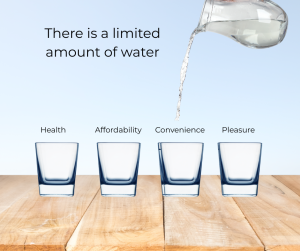
Affordability, Convenience, Pleasure, and Health.
We only have so much mental or emotional bandwidth – or water in this visual.
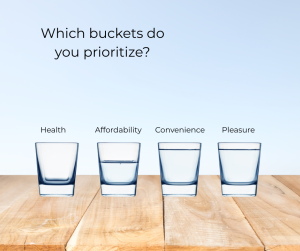
Without realizing it, most of us put the bulk of our energy into convenience and pleasure. That’s not a moral failing – it’s how we’ve been conditioned. It’s been deliberately engineered by big food companies that have become mega-giants – they study our brains to find the “bliss point” and then they leverage it. They use shady marketing techniques to get us to rationalize choosing their products over other things. They have a very successful playbook for it – ironically, one borrowed from the tobacco industry – but that’s a story for another day.
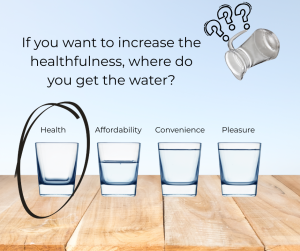
When we increase one bucket, it usually means something has to come out of another.
But if we are used to subconsciously allocating our limited energy into these buckets and we make a conscious choice that health needs to be more of a priority, we struggle to figure out where to get the energy. We don’t want to borrow it from one of the other buckets – but most of us can’t just conjure up more energy out of thin air – at least not for long.
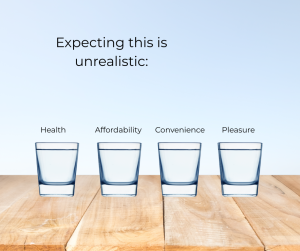
This is the real work.
Cooking isn’t hard because we’re doing something wrong.
It’s hard because we live in a world that makes convenience and pleasure the default – which makes preparation feel like work. Like sacrifice.
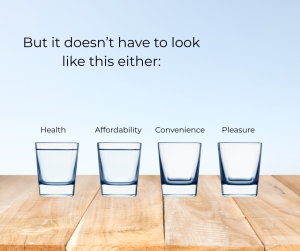
We say all the time in our clinic that you can’t fix something until you understand it. When we can step back and see it, it becomes easier to see why it’s hard to change things. The actual execution may still be difficult – changing habits and patterns and mindset isn’t simple – but it’s better than feeling like we are powerless.
